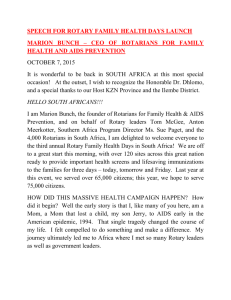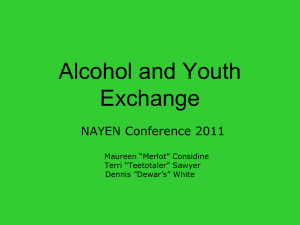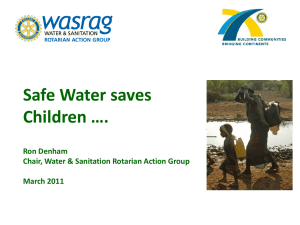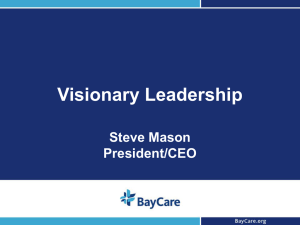What are Strategic Partners?
advertisement
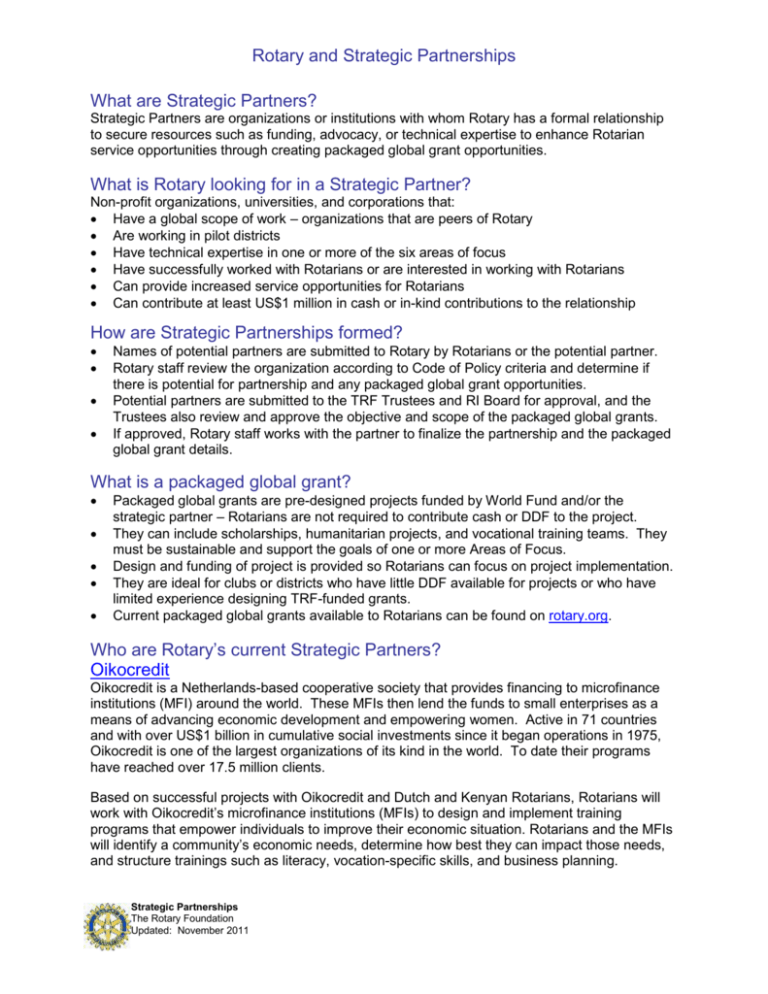
Rotary and Strategic Partnerships What are Strategic Partners? Strategic Partners are organizations or institutions with whom Rotary has a formal relationship to secure resources such as funding, advocacy, or technical expertise to enhance Rotarian service opportunities through creating packaged global grant opportunities. What is Rotary looking for in a Strategic Partner? Non-profit organizations, universities, and corporations that: Have a global scope of work – organizations that are peers of Rotary Are working in pilot districts Have technical expertise in one or more of the six areas of focus Have successfully worked with Rotarians or are interested in working with Rotarians Can provide increased service opportunities for Rotarians Can contribute at least US$1 million in cash or in-kind contributions to the relationship How are Strategic Partnerships formed? Names of potential partners are submitted to Rotary by Rotarians or the potential partner. Rotary staff review the organization according to Code of Policy criteria and determine if there is potential for partnership and any packaged global grant opportunities. Potential partners are submitted to the TRF Trustees and RI Board for approval, and the Trustees also review and approve the objective and scope of the packaged global grants. If approved, Rotary staff works with the partner to finalize the partnership and the packaged global grant details. What is a packaged global grant? Packaged global grants are pre-designed projects funded by World Fund and/or the strategic partner – Rotarians are not required to contribute cash or DDF to the project. They can include scholarships, humanitarian projects, and vocational training teams. They must be sustainable and support the goals of one or more Areas of Focus. Design and funding of project is provided so Rotarians can focus on project implementation. They are ideal for clubs or districts who have little DDF available for projects or who have limited experience designing TRF-funded grants. Current packaged global grants available to Rotarians can be found on rotary.org. Who are Rotary’s current Strategic Partners? Oikocredit Oikocredit is a Netherlands-based cooperative society that provides financing to microfinance institutions (MFI) around the world. These MFIs then lend the funds to small enterprises as a means of advancing economic development and empowering women. Active in 71 countries and with over US$1 billion in cumulative social investments since it began operations in 1975, Oikocredit is one of the largest organizations of its kind in the world. To date their programs have reached over 17.5 million clients. Based on successful projects with Oikocredit and Dutch and Kenyan Rotarians, Rotarians will work with Oikocredit’s microfinance institutions (MFIs) to design and implement training programs that empower individuals to improve their economic situation. Rotarians and the MFIs will identify a community’s economic needs, determine how best they can impact those needs, and structure trainings such as literacy, vocation-specific skills, and business planning. Strategic Partnerships The Rotary Foundation Updated: November 2011 More information about the partnership with Oikocredit can be found on rotary.org. Aga Khan University The Aga Khan University (AKU) is a member of the Aga Khan Development Network and was chartered in Karachi, Pakistan in 1983. AKU operates eleven campuses in eight countries across East Africa, the Middle East, South and Central Asia, and Europe. The University’s curricula in nursing, medicine, and educational development reflect the unique needs of the communities and countries where it operates, so that students and graduates can immediately apply their knowledge where it will have the most impact. Rotarians will select students for scholarships to study nursing and midwifery at AKU’s School of Nursing programs in East Africa. Scholarship recipients will also be mentored through their program by local Rotary clubs. Second, Rotarians will develop vocational training teams (VTTs) to enhance the clinical and administrative skills of university-level nursing educators, thus improving the quality of the education the nurses receive. The VTTs will work with local Rotarians and the strategic partner to coordinate and implement a field service project that connects the training to existing clinics or medical programs. More information about the partnership with AKU can be found on rotary.org. Mercy Ships Mercy Ships is a global charity that has operated hospital ships in developing nations since 1978. Currently focusing on West Africa, Mercy Ships provides free medical services to the poor along with a variety of other services designed to improve health and increase access to healthcare. Since its inception, Mercy Ships has provided medical and humanitarian services valued at over $748 million and impacted more than 2.2 million people as direct beneficiaries. Based on successful projects with Mercy Ships and US, Latin American, and African Rotarians, Rotarians will develop vocational training teams (VTTs) composed of medical professionals who will perform or assist in critical surgeries. The teams will also provide skill training to local healthcare professionals. Potential teams could include surgeons, nurses, or anesthesiologists. More information about the partnership with Mercy Ships can be found on rotary.org. UNESCO-IHE UNESCO-IHE, based in Delft, The Netherlands, is the largest international post-graduate water education institution in the world and the only institution within the United Nations system to confer accredited Master of Science (MSc) and Doctor of Philosophy (PhD) degrees. Since 1957, the Institute has provided postgraduate education to more than 15,000 water professionals from 162 countries, the vast majority of whom come from the developing world. 87% of their alumni remain active in the water and sanitation sector 10 years after graduation. Rotarians will interview and select students to receive scholarships for UNESCO-IHE’s 18month Master of Science degree-granting programs. The three eligible programs will be Municipal Water and Infrastructure, Water Management, and Water Science and Engineering. Students from any pilot district will be eligible once they have secured academic admittance from the Institute, as per Future Vision scholarship requirements. More information about the partnership with UNESCO-IHE can be found on rotary.org. Strategic Partnerships The Rotary Foundation Updated: November 2011
